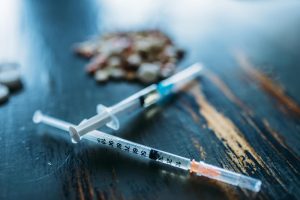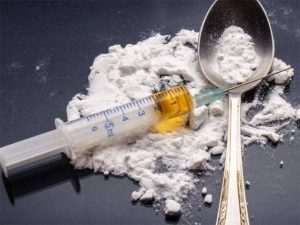Speedball is a combination of two drugs – heroin and cocaine. Heroin is a depressant, and cocaine is a stimulant. Therefore, speedball is a combination of two illegal substances with opposite effects.
It is much easier to develop an addiction to speedball than to other drugs because you are using two substances at once. The joint effects of heroin and cocaine can wreak havoc on your body. In many cases, it can even have fatal consequences.
If you have been addicted to speedball, the best way to kick the habit is to get formal treatment. Speedball detox is the first step of that. Read on to find out more about how long this will take.
Why is speedball dangerous?
 Speedball is composed of two illegal drugs: heroin and cocaine. Using more than one drug at once increases the chances of addiction. Also, you will develop an addiction quickly when you speedball. In some cases, using it even a few times can prove fatal.
Speedball is composed of two illegal drugs: heroin and cocaine. Using more than one drug at once increases the chances of addiction. Also, you will develop an addiction quickly when you speedball. In some cases, using it even a few times can prove fatal.
Many speedball users mistakenly believe that the opposing effects of cocaine and heroin will cancel out each other’s negative effects. In reality, though, this is not accurate. What happens is the negative effects of each drug can be amplified.
Here is one particularly dangerous effect of speedballing. Cocaine, being a stimulant, increases activity in your nervous system. In turn, you will become more alert, awake, and physically active. This will cause your body to require more oxygen to keep up with the higher activity levels. On the other hand, heroin is a depressant, which relaxes your body, including the lungs and heart. Heroin can slow down your breathing and heart rate to dangerously low levels.
Combine the two effects and you get a potentially fatal situation. Your body requires more oxygen but cannot get it. Soon enough, you will suffer from oxygen deprivation. This needs immediate medical attention to save your life.
Enrolling in a speedball detox program helps prevent these side effects from creating more damage in your body.
What happens during speedball detox?
Detox is a process that aims to rid your body of all traces of speedball. Since it’s composed of both heroin and cocaine, speedball detox takes longer and requires more care than detoxing from only one drug.
Detox is often medically assisted for the best results. Doctors and nurses will be on standby to treat you anytime you encounter complications, discomfort, or any medical emergencies. In case you need medical attention, you will get it without delay. This is especially helpful if ever you develop any life-threatening withdrawal symptoms.
Speedball withdrawal symptoms
Since speedballing involves the use of both cocaine and heroin, you will find similar withdrawal symptoms. These include:
- Abdominal pain
- Shaking
- Sweating
- Nervousness
- Agitation
- Nausea
- Depression
- Fatigue
- Muscle spasms
- Drug cravings
- Depression
- General discomfort
- Increased appetite
- Agitation
- Restlessness
- Decreased alertness and activity level
- Vivid, unpleasant dreams
You can get these symptoms shortly after you stop speedballing. Some of them are mild, but in many cases, the accumulated effects can get too unbearable. When you reach this point, you will have a strong compulsion to speedball again just to relieve the withdrawal symptoms.
For this reason, quitting speedball on your own often does not succeed.
Tapering off
 The highest success rates are found when detox is done gradually. This is a method known as “tapering off,” and it involves decreasing your dose of speedball slowly. The dose is progressively brought down until your body can tolerate a zero dose. Doctors will monitor your progress, and if your body responds well, your taper will end faster. If you experience unpleasant withdrawal symptoms, doctors may have to use a slower and longer taper.
The highest success rates are found when detox is done gradually. This is a method known as “tapering off,” and it involves decreasing your dose of speedball slowly. The dose is progressively brought down until your body can tolerate a zero dose. Doctors will monitor your progress, and if your body responds well, your taper will end faster. If you experience unpleasant withdrawal symptoms, doctors may have to use a slower and longer taper.
You may also be prescribed medications to ease the discomfort of withdrawal. These medications may be similar to what is prescribed in heroin and cocaine detox.
Medications that counteract heroin withdrawal
These medications are often used to combat the withdrawal symptoms of heroin:
- Naltrexone
- Buprenorphine
- Methadone
These medications target the same parts of the brain as heroin. They bind competitively against heroin in those parts, reducing heroin’s rewarding effects.
Medications that counteract cocaine withdrawal
On the other hand, here are a few of the medications prescribed for the withdrawal symptoms of cocaine:
- Baclofen
- Modafinil
- Vigabatrin
- Topiramate
- Gabapentin
These medications promote the release of GABA and dopamine, which are two brain chemicals that help you relax. In turn, the stimulating effects of cocaine are decreased.
How much time do I have to spend in detox?
 The length of detox varies based on different factors. One of them is the kind of drug you have an addiction to. Different drugs have different detox schedules.
The length of detox varies based on different factors. One of them is the kind of drug you have an addiction to. Different drugs have different detox schedules.
Another factor is how many drugs you are currently addicted to. Addictions to only one drug are easier to detox from than addictions to two or more drugs (polydrug abuse).
Speedballing is a form of polydrug abuse, so detox from it will take longer than detoxing from other drugs. Polydrug abuse cases also need more careful attention by medical personnel to ensure your safety.
Most detox procedures last more or less a week. These are for cases of single drug addictions, though. For cases of polydrug abuse, like speedballing, the process takes longer.
If detox is part of a residential rehab program, the actual stay in the rehab center may be as long as three months. Inpatient rehab is beneficial, especially for cases of polydrug abuse, because of the more controlled environment.
While you are living in a rehab facility, you can fully focus on your recovery. You will have a structured daily schedule filled with activities geared towards preparing you to live a drug-free lifestyle.
What happens after detox?
Detox is the first stage of a complete recovery program. After it, you will go through various behavioral therapies designed to address the psychological effects of speedball. Examples include:
- Dialectical behavior therapy
- Cognitive behavioral therapy
- Contingency management
- Individual and group counseling
- Support groups
- Recreational therapy
After behavioral therapies, you should be able to live a sober life once again, like before.